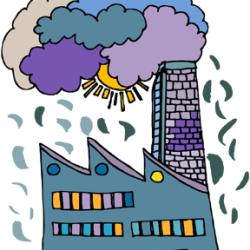Source Institutions
Source Institutions
Add to list Go to activity
Activity link broken? See if it's at the internet archive

In this chemistry demonstration, acid rain is simulated in a petri dish. Sodium sulfite (NaSO3) and hydrochloric acid (HCl) are mixed to create sulfur dioxide gas (SO2), which is a common byproduct of industrial processes. In the air, this gas mixes with rainwater (H2O) and then with oxygen (O2) to produce sulfuric acid (H2SO4). In the petri dish, this same reaction occurs and "acid rain" is produced. The pH change of each of the reactants and products is shown by a few drops of bromothymol blue--a common pH indicator. This activity is part of the Environmental Chemistry unit in OMSI's Chemistry Lab. Materials estimates are for 100 uses. For safety reasons, this activity works best as a demonstration for younger audiences.
- 10 to 30 minutes
- 5 to 10 minutes
- $1 - $5 per group of students
- Ages 14 - adult
- Activity, Demonstration, Experiment/Lab Activity, Simulation
- English
Quick Guide
Materials List (per group of students)
- Plastic petri dish with lid (keep two on hand)
- Four 30-ml dropper bottles
- Na2SO3 (sodium sulfite) (keep 200 g on hand)
- 1M HCl (hydrochloric acid) (keep 100 ml on hand)
- concentrated HCl (keep 100 ml on hand)
- Two plastic 500-ml storage bottles
- One plastic 125-ml storage bottle
- Bromthymol blue sodium salt (keep 5 g on hand)
- One white plastic mat
- Cloth dish towel
- Large plastic bowl
Subjects
-
Earth and Space Science
-
Earth Structure
- Atmosphere
-
Earth Structure
-
Physical Sciences
-
Chemistry
- Chemical Reactions
- Acids and Bases
-
States of Matter
- Gases
-
Chemistry
Informal Categories
- Nature and Environment
Audience
To use this activity, learners need to:
- see
- see color
Learning styles supported:
- Involves hands-on or lab activities
Other
Components that are part of this resource:
This resource is part of:
Access Rights:
- Free access
By:
Rights:
- All rights reserved, Oregon Museum of Science and Industry, 1997
Funding Source:
- National Science Foundation
